Part 1: Mitch the Mage
Let's get things started with character creation.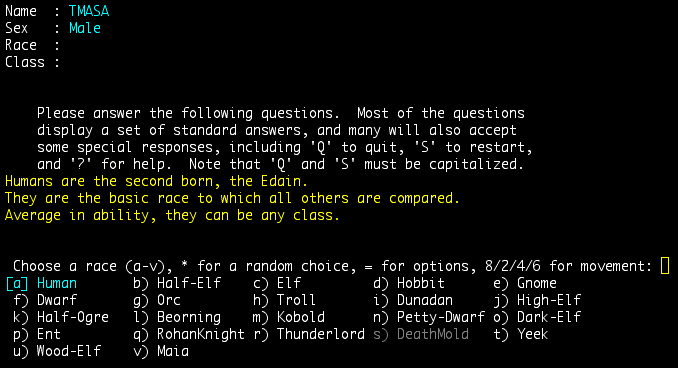
The game has a gigantic number of races and classes. Mostly these are just minor variations on the "how smart/tough/wise do you want to be" spectrum, with a few extra abilities like innate elemental resistances (elves resist light, for example), being able to see invisible (high-elves), etc.
Two notable standouts are the RohanKnights, whose mounts give them innate speed boosts as they level up (speed is the God Stat in any Angband variant, since you do literally everything faster at higher speeds), and the Thunderlords, which are thinly-disguised Pern-style dragonriders. ToME was originally called "PernAngband", and there's a whole range of color-based enemy thunderlords and some uniques who drop hilariously overpowered artifacts when you kill them.
Anyway, we're going with a hobbit. Hobbits aren't all that outré, but they have great stats across the board except for Strength. Having selected our race, now we get to choose what kind of Hobbit to pick:
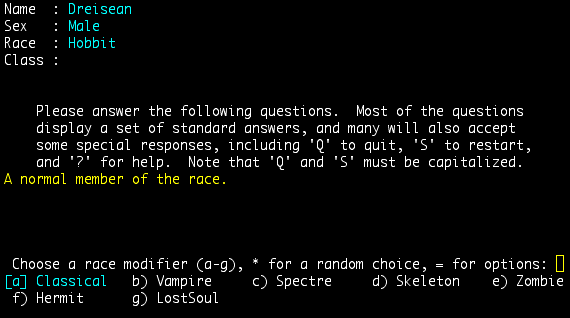
This is basically another opportunity to twink your character. Skeletons and zombies make great warriors and horrible casters, spectres have abysmal hitpoints but can walk through walls, vampires are great across the board except they burn up in sunlight (until you get gear that gives resistance to light) and they have to suck blood from enemies to get food. Hermits have bad hitpoints and good spellpoints, and Lost Souls start at character level 1, dungeon level 99, and have to walk all the way back up to the surface before they can start the game proper.
We'll just go with a standard, "Classical" hobbit. It may seem like I'm picking boring choices, but there'll be plenty of madness later, and I don't generally find the tradeoffs of the race variants to be worthwhile.
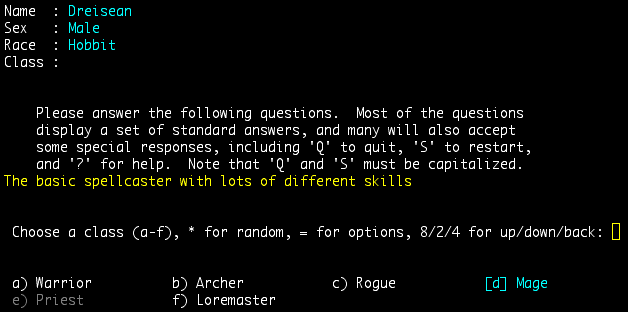
Our available classes. Except that there's way more classes available; this just splits them up into categories so the display doesn't break when it shows them all. For some reason, priests aren't recommended for hobbits. Weird. We pick a mage.
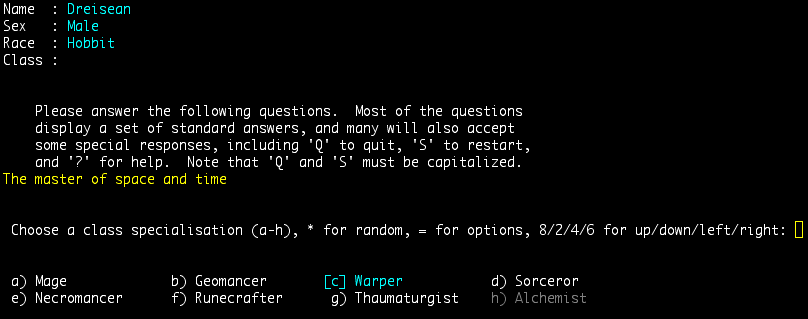
And now we get our sub-types of mage. Each mage has an aptitude with certain spell realms, each of which has its own dedicated skill that has to be leveled up. For example, Geomancers have good modifiers for learning the Air/Earth/Fire/Water realms, and less-good modifiers at everything else. We pick a Warper; they have good modifiers for Divination (knowledge), Conveyance (teleportation), and Temporal (a mishmash of spells that most importantly includes the haste spell). This sounds kind of useless without methods of killing things, but we still have access to the other realms, so we'll be fine.
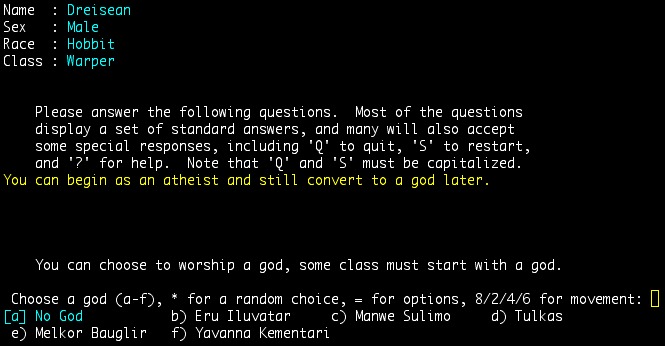
And now we pick a religion. If you worship a god, then you have to adhere to certain conducts -- they like it when you do things and dislike it when you do other things. Yavanna, for example, is a pain in the ass because she hates it when you kill "natural" monsters like snakes, elephants, mice, etc. Having a high piety score (how much the god likes you) gives you stat bonuses and possibly other useful effects. We pick Tulkas, who gives Strength and Constitution benefits, and is extremely easy to please as all he cares about is that you kill things when you pray to him -- preferably evil things or demons.
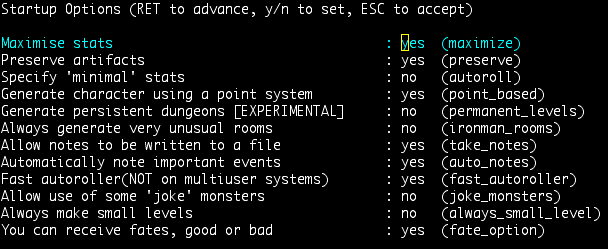
The "birth" options screen. Most of these affect difficulty in some minor way. Not too important.

How many random quests we want. There's four "core" dungeons: the Barrow-Downs, Mirkwood Forest, Mordor, and the Pits of Angband, for 100 levels total. Random quests are evenly spaced along these levels according to how many you ask for at the start of the game. Every quest is either "kill some out-of-depth enemies to rescue a captive princess for a good item" or "kill some out-of-depth enemies to rescue a wandering adventurer for some free skill boosts". We pick 98; if we get tired of doing quests there are ways to skip them.
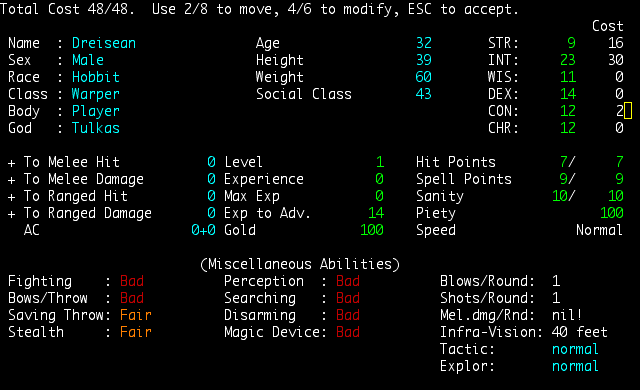
Allocation of stat points. We need INT for our spellcasting, STR so we can carry crap around, and the rest goes into CON to ameliorate our hitpoint situation. And then we give a name to our scrawny halfling spellslinger.

That sounds like a good name.
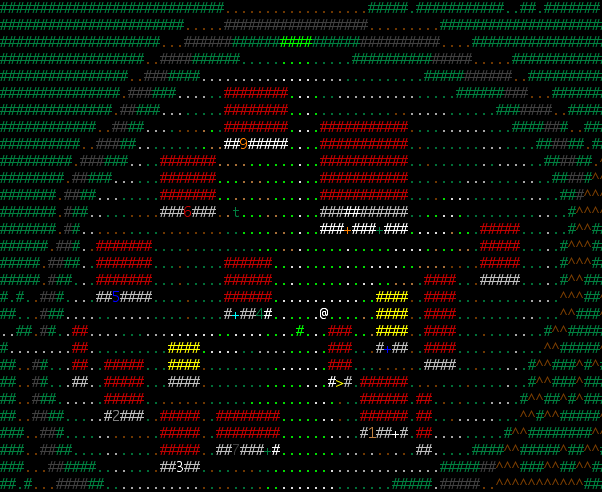
And here we are in Bree! The numbers and colored + signs are shops of various kinds, and the yellow > is a quest entrance. Turns out there's some rogues that have taken over a building in the town and the mayor (in the orange +) wants us to kill them all. We'll get to that in a bit. First we hit < and access the overworld.
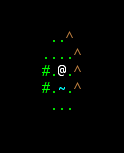
The extremely unmapped overworld. That's fine though, all we want is to find some monsters in the grasslands to the north.
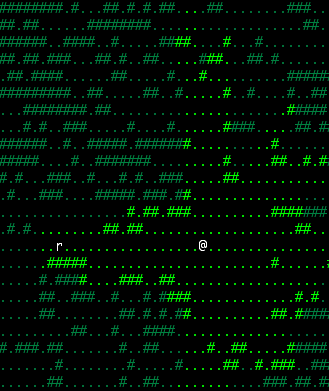
See, the thing is, we're a level-1 hobbit mage. We have all of 7 hitpoints. We aren't going to survive diddly squat if we get into melee range with anything. So we're going to head out here and kill some hapless wildlife until we've learned enough to get some better skills under our belts.
The # are trees, which we can't see or walk through (anyone that can fly can go through trees though). The r is a rodent, a giant white mouse. We're gonna kill it. With our magic.

Okay, so we don't have all that much magic yet. Every mage starts with 1 point in the Mana school so they can cast Manathrust, which is basically Magic Missile. Leveling up the Mana school will increase the level of the spell, which increases its damage and cost. Manathrust gets hilariously powerful later on, though it'll only ever hit 1 enemy at a time.
The Giant white mouse dies.
Easy-peasy. To regenerate the plains we're on, we can just hit < and then >, which will hopefully give us more monsters to kill. Scumming the grasslands and killing the odd mouse and giant insect brings us to 1 experience away from hitting level 2, and then we find this guy:
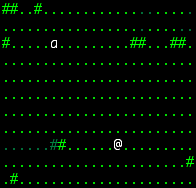
Just a Giant White Ant, but they're a little tougher than the other monsters we've been killing and thus worth a whopping 21 experience (for comparison, we need 14 to hit level 2).
The Giant white ant shrieks in pain. The Giant white ant flees in terror!
The Giant white ant cries out feebly.
The Giant white ant dies. Welcome to level 2. You can increase 6 more skills.
Our HP nearly doubles, to 13, and we can now level up a bit!
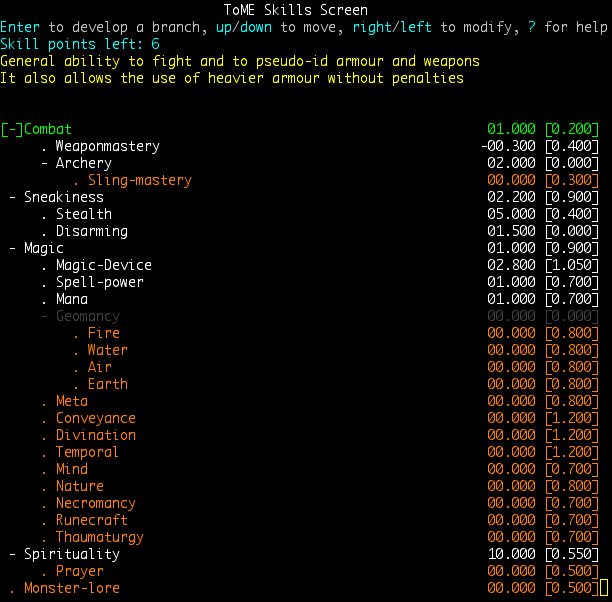
Each skill here has a rank and a multiplier, which indicates how many points we get for each skillpoint we invest. Thus it'd take 5 points of investment for us to gain a single rank in Combat -- absolutely not worth it. Mitch is never going to use his weapon as anything other than a stat stick. On the other hand, we have much better rankings in everything under the Magic skill.
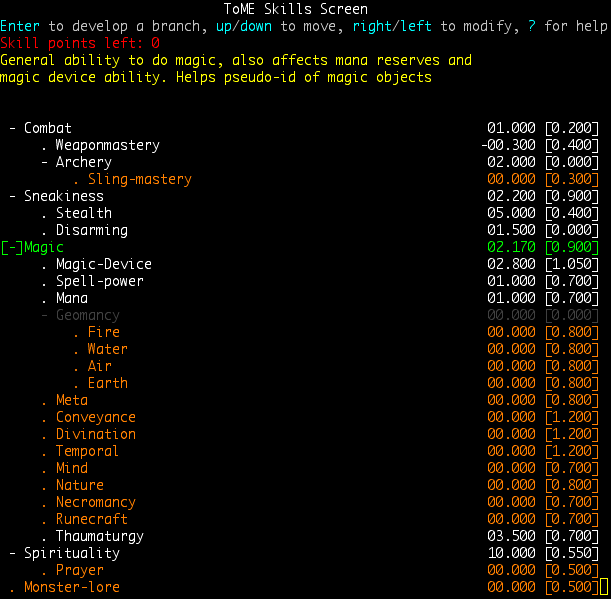
We dump 5 points into Thaumaturgy and 1 point into Magic, completely ignoring our nominal class skills. The Magic skill gives us extra spellpoints; we go from 10 to 16. Thaumaturgy in turn gives us a bunch of random attack spells, to wit:

Essentially, you get an elemental damage type and an area of effect: bolt, beam, ball, "view" for everything in line of sight, and "area" for basically calling in an airstrike on your position. The damage the spells deal, as well as their mana cost, depend on how early they unlock, so the spells from getting rank 50 in Thaumaturgy are a lot more powerful than the ones we just got.
We try out every one of our new spells, thereby learning the damage they deal:

Kind of underwhelming. But the real strengths of the Thaumaturgist are twofold:
1) Area spells are broken as fuck.
2) Exotic elements have all kinds of fancy unresistable effects attached to them.
We got some decent options here: Sound attacks can paralyze ("stun") enemies, Inertia attacks can slow them down and the slowing stacks and never goes away, and Water confuses and stuns. Chaos can confuse and polymorph, which is kind of niche. None of these guys compete with Manathrust for damage right now, but higher-level skills will fix that.
We kill another Giant White Ant, hit level 3, and grab some more spells:
Bolt - meteors; 1d12 damage
Area - wall creation
Blast - wall destruction
View - inertia; 1d14 damage
Sweet. Meteors are basically just fire damage, but wall creation and destruction are both very useful, and having a spell that hits every enemy in LOS with inertia is tantamount to a Slow Everything spell.
What does Area - Wall Creation do? This:
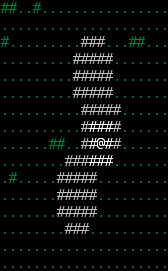
Basically what this did was fire a series of radius-2 balls at random targets near us, and each ball created walls where it hit. I tried to grab an animation of this, but my toolkit appears to not be up to the task; if anyone knows of a good way to produce GIFs from screen recordings on OSX, feel free to suggest it.
Meanwhile, the Blast - Wall Destruction does this:
The wall turns into mud! The wall turns into mud! The wall turns into mud! The wall turns into mud! The wall turns into mud! The wall turns into mud! The wall turns into mud! The wall turns into mud!
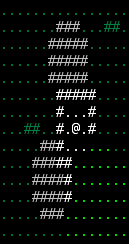
"Blast" spells create a giant ball effect centered on the player; this one is about a radius-5 if I'm any judge, though it stops when it hits a wall (and disintegrates it). Normally they do crap damage, but we don't really care in this case.
Anyway, we have plenty of spells to use against those rogues in town now. Back to Bree!
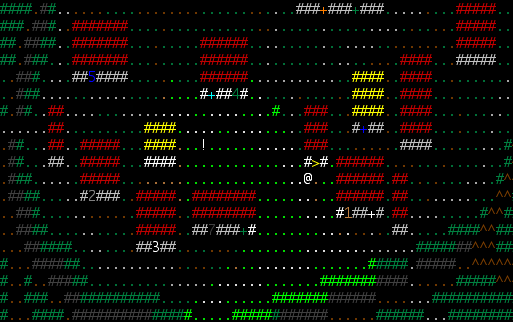
We head into the quest, and
You feel a vicious blow on your head. You have no more Books of Beginner Cantrips. You have no more Rations of Food. You have no more Wooden Torches (with 2500 turns of light). You have no more Daggers (1d4) (+0,+0). You have no more Parchments - Adventurer's Guide to Middle Earth. You wake up in a prison cell. All your possessions have been stolen!
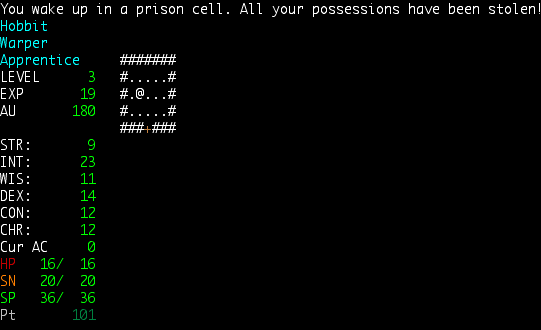
Stupid plot trickery.
 No big deal though, because these guys are the worst guards in the history of everything.
No big deal though, because these guys are the worst guards in the history of everything. You failed to pick the lock. <53x>
You have picked the lock.
Technically we have a pretty awful skill at traps and lockpicking, but I think anyone who can pick a lock with their bare fingers deserves some praise.
 And look, no guards!
And look, no guards!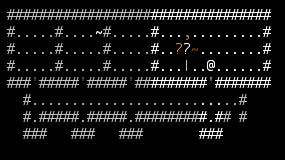
Still no guards, and we've found our gear! We grab everything except the Adventurer's Guide to Middle Earth, which has a bunch of starting tips that we don't need.
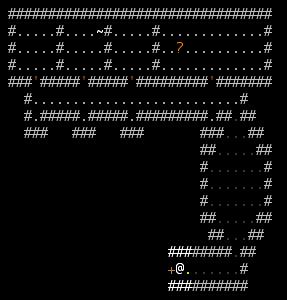
This door is where all the actual action is. They steal all your gear, then don't do anything to stop you from getting it back. About the only way this could slow you down is if you were already hungry and managed to starve to death before dealing with the locked doors.
You failed to pick the lock. <4x>
You have picked the lock. An alarm rings! The door explodes.

What the hell are these rogues even doing here?
All of this scripted nonsense is from DarkGod screwing around with Lua, which he bodged into the game at some point. There's a few other minor scripted events in the game that use Lua, but for the most part it's pretty vestigial and everything else is hardcoded.
Anyway, we move back from the erstwhile door, and are chased by some Novice Rogues:
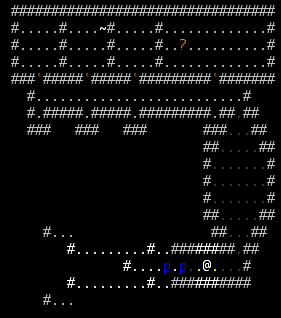
They aren't all that threatening, largely because their melee attacks can steal gold, which then causes them to teleport away. Thus even if they reach melee range they don't stick around long enough to deal serious damage. But let's try out our Sound Bolt.
The Novice rogue is dazed.
And like that, he's totally helpless. We're able to take several steps backwards to create more space.
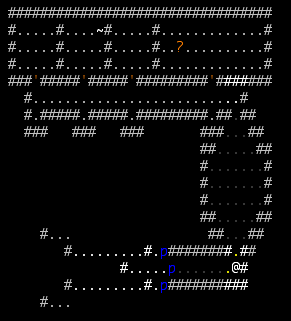
His buddies are piling up at the entrance to the corridor; he's somewhere in the middle, but we can't see him because our infravision as a hobbit isn't all that good. Still though, a single point of mana bought us easily half a dozen turns of freedom. This is what makes Thaumaturgists so good.
We open fire with our Inertia Beam next.
It grunts with pain. The Novice rogue starts moving slower.
Beam spells hit everything on a line, so that poor guy we stunned earlier is now also probably slowed (though we couldn't see it happen, so we got no message). The rogue standing at the entrance is definitely slowed too. We spam Inertia Beam a few more times.
It grunts with pain. The Novice rogue starts moving slower. The Novice rogue starts moving slower.
And then I typo and cast the wrong spell.
The Novice rogue changes! The Novice rogue is unaffected. The Novice rogue changes!
The Skeleton orc changes! It grunts with pain. The Hill orc changes! The Dark elven mage is unaffected. The Raven changes! The Green ooze changes! The White harpy is unaffected.
Oops.
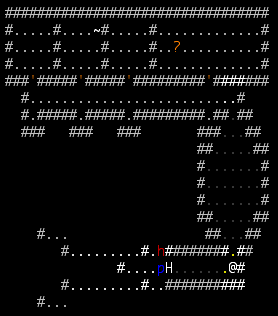
Okay so. That was View - Chaos. And I cast it twice. Go me. Some of the rogues have now been polymorphed into random monsters, and these guys are a ton more threatening than the novice rogues, especially that Dark Elven Mage who can cast attack spells at us and moves quickly.

Nothing for it but to keep spamming Inertia Beam though, I guess.
It cries out in pain. The White harpy dies. The Novice rogue starts moving slower.
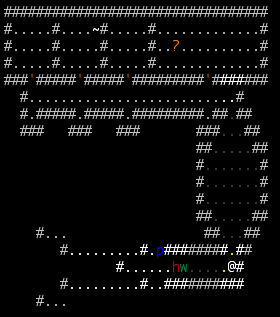
Fortunately, that Dark Elven Mage has a light source, revealing that he's stuck behind a Green Worm Mass, which is a slow-moving, multiply monster with a decent stock of hitpoints. We just need the mage to not cast any spells at us.
The Green worm mass starts moving slower. The Dark elven mage starts moving slower.
That'll help. But we're now down to half our stock of spellpoints, and the mage is functionally unhurt. Let's create some space and rest up. And by "create some space" I mean "embed ourselves in a tomb of solid granite 50' thick."
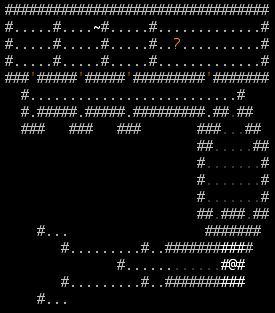
Ahh, nice and cozy. The monsters won't get up to much while we're in here, except maybe breed some more worm masses. Once we're rested, we take out the walls with some Wall Destruction blasts.
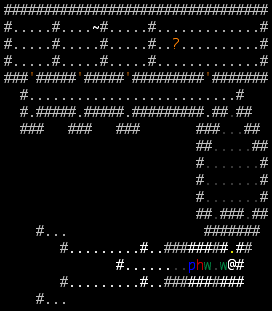
And resume slinging spells. Four Inertia Bolts later and everything around us is making a fair approximation of molasses. Like I said, slowing in this game stacks and never goes away (at least, for monsters; the player recovers with time). So that Dark Elven Mage has gone from moving twice as fast as us to moving maybe 1 turn in 6.
That done, we switch to Manathrust to actually start damaging these guys.
You failed to get the spell off! The Dark elven mage casts a stinking cloud. The Green worm mass screams in agony.
But what about my Parry skill? Tumbling?
Dump the screen? [y/n]
You are poisoned!
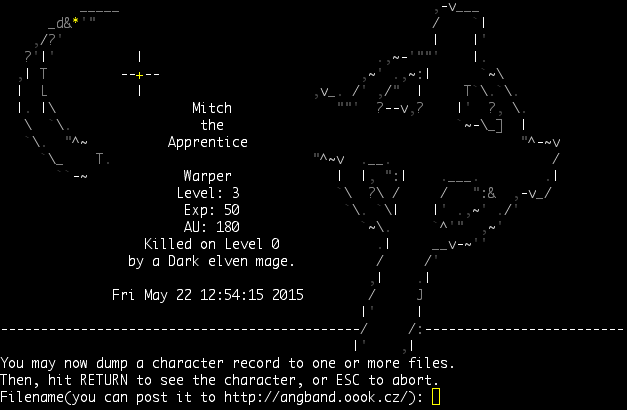
Oops.